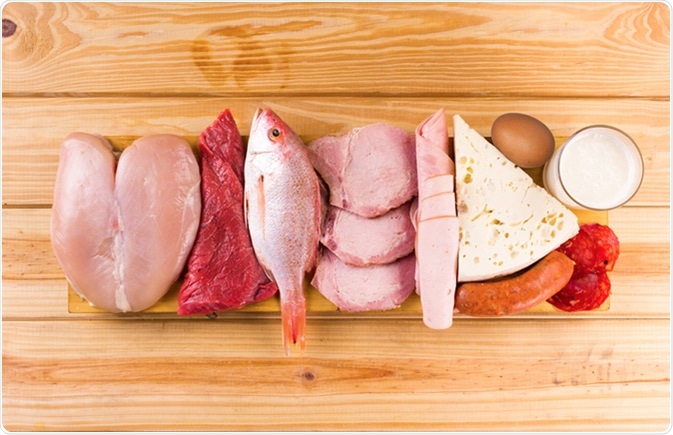The Dukan diet is similar to the traditional Atkins diet, a ketogenic eating plan designed to ensure high fat and protein consumption and low carbohydrate intake.
However, the Dukan diet is even more restrictive than Atkins. No carbohydrates other than a small amount of oat bran are allowed at the beginning and even vegetables low in carbohydrates such as spinach and cabbage are not allowed initially. Also, unlike Atkins, fat is severely limited and foods such as eggs, steaks and chops are not allowed.
The low-carbohydrate diet was originally introduced in France where it was called the “‘Je ne sais pas maigrir” (I do not know how to lose weight) diet. In 2010, the diet reached the UK and was renamed the Dukan diet, after its developer Pierre Dukan.

Image Credit: nehophoto / Shutterstock
How the Dukan Diet Works
If carbohydrate stores are plentiful in the body, these are burnt as a source of energy instead of fat. Ketogenic diets ensure a low carbohydrate intake in order to force the body to switch from burning carbohydrates to burning fat. This can offer the benefit of weight loss, but an accumulation of ketones in bodily tissues can cause problems and lead to signs of ketosis. The length of time people stay on the diet depends on their current weight, their desired weight and their fitness level.
The diet is made up of four phases and these are briefly described below.
Dukan Diet on ABC NightLine
Attack Phase
This lasts for five to ten days. No carbohydrates are eaten and there are 72 high-protein, low-fat foods to choose from.
Cruise Phase
Pure protein intake is encouraged and some carbohydrates are gradually introduced, with a selection of certain vegetables eaten every other day. Dieters stay in this phase until they have achieved their weight goals.
Consolidation Phase
Foods that were not previously allowed such as dairy products and fruit are slowly introduced and dieters can “celebrate” by eating whatever they like twice a week.
Stabilisation Phase
If eating carbohydrates has not led to weight gain, dieters can move onto the “rules for life,” where they eat normally but have a pure protein day once a week that follows the rules of the attack phase. Dieters also commit to walking 20 minutes per day and eating 3 tbsp of oat bran every day.
Advantages and Disadvantages
The advantages and disadvantages of following the Dukan diet are described below.
Positives
- People can lose weight rapidly, which can be highly motivating
- Food does not need to be weighed
- Calories do not need to be counted
- The strict rules can mean the diet is very effective
- The restricted choice can make meal planning easier
- Refined and processed fatty and sugary foods are eliminated
- Alcohol is eliminated
- Unlike the Atkins diet, fat and salt intake are significantly reduced, both of which are good health habits to maintain
- Celebrating meals in fourth stage encourages adherence
Negatives
- Switching from carbohydrate burning to fat burning produces ketones which can lead to bad breath , dry mouth, fatigue, headaches, nausea, insomnia and weakness
- In the attack phase, people can feel so tired that Dr. Dukan advises people completely avoid strenuous activities
- Avoiding all carbs apart from oat bran can lead to constipation
- In the long term, the lack of whole grains, fruit and vegetables can lead to nutritional deficiencies and a lack of antioxidants , which is associated with problems ranging from cancer and heart attack to premature aging. Multivitamins are therefore recommended but this is not as effective as absorbing nutrients from food.
- Some researchers believe a very high protein intake leads to kidney problems and bone weakness
- There is no flexibility in the diet, which can become monotonous and boring causing many people to give up on it
- Protein-rich foods tend to be more expensive than carbohydrates, fruit and vegetables
- The diet does not educate people about a balanced, healthy diet
- The diet is unsuitable for individuals with high cholesterol, eating disorders, gout or kidney disease
Further Reading
Last Updated: Feb 26, 2019